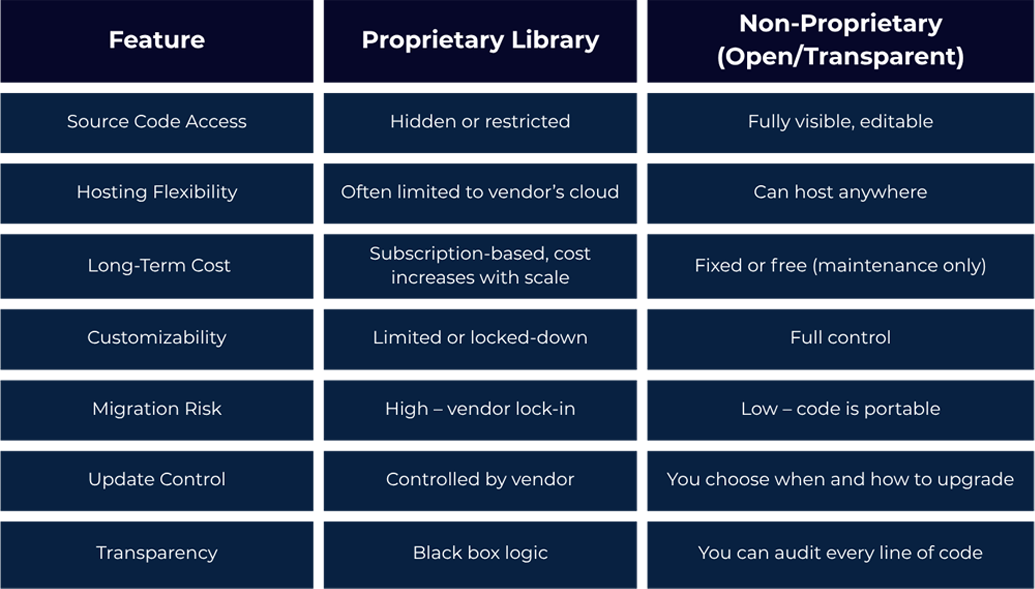Why Owning Your Code Matters - Avoiding the Trap of Proprietary Libraries
Emma Klinteberg - 30 June 2025

What is a proprietary library, and why should developers care? This post breaks down the trade-offs, risks, and long-term benefits of owning your code.
Why Owning Your Code Matters: Avoiding the Trap of Proprietary Libraries
Proprietary libraries can be tempting. They often promise to save you time, reduce setup complexity, and give you powerful pre-built features. But they come with trade-offs—some of which can seriously impact the long-term health, flexibility, and sustainability of your software.
Let's break down what proprietary libraries actually are, why they can become a problem, and how to evaluate your options.
What Is a Proprietary Library?
A proprietary library is a piece of software that is owned and maintained by a single company or entity. Unlike open-source tools, it may:
- Require a license or subscription to use
- Hide its source code
- Limit how much or how deeply you can customize it
- Control the release cycle (you can't patch it yourself if something breaks)
- Often restrict where or how you can host your application
These libraries can be part of closed platforms, SDKs, or even low-code tools where you only see the configuration interface and not the logic behind it.
Why Developers Choose Them
It's understandable. Proprietary tools can reduce complexity fast:
- You don't have to reinvent the wheel
- Many include powerful visual interfaces or pre-built integrations
- You may get support and documentation directly from the vendor
The real question is: at what cost?
Proprietary vs. Non-Proprietary: A Practical Comparison

Why This Matters More Than Ever
With the rise of AI-assisted development, no-code platforms, and third-party integrations, it's never been easier to build quickly. But it's also never been riskier to give up control of your tech stack.
When things go wrong, whether it's a sudden price increase, an unsupported feature, or a vendor shutting down, you're stuck.
And what happens when your application grows?
As user traffic increases and your hosting needs evolve, will your stack be able to scale with you?
Or will you find yourself having to rewrite everything once you hit a new threshold?
Imagine this: you're gaining traction, investor interest is growing, and suddenly… the library you've built half your product on hits its limit. You're forced into an expensive upgrade, or worse, a full rewrite with weeks of lost development time.
This isn't just a technical decision anymore. It's a business one.
Owning your code means:
- You decide when to scale or migrate
- You're not held "hostage" by someone else's roadmap
- Your data and security policies stay yours
- Your app can evolve without needing to start over
What to Look for Instead
If you're planning a new build or assessing your current stack, consider tools and platforms that:
- Use open standards and open-source libraries
- Let you export the full codebase
- Don't lock you into proprietary hosting
- Make it easy to add, replace, or remove components over time
Sustainable systems are modular and transparent. You don't need to rebuild your app every time your needs change, you just plug in the next piece.
Final Thought
Fast is great. But being fast, flexible, and independent? That's the real win.
Before you commit to a library or platform, ask yourself: “Who owns the code I'm building, and who gets to decide what happens to it?”